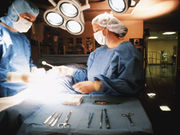CRP ≥4.0 mg/dL on post-op day 4 predicts serious infectious complications after esophageal cancer sx
TUESDAY, Jan. 19, 2016 (HealthDay News) — C-reactive protein (CRP) on postoperative day 4 (POD 4) after esophagectomy is associated with increased odds of serious infectious complications (SICs), according to a study presented at the American Society of Clinical Oncology’s annual Gastrointestinal Cancers Symposium, held from Jan. 21 to 23 in San Francisco.
Kazuki Kano, M.D., from the Kanagawa Cancer Center in Yokohama, Japan, and colleagues conducted a retrospective study involving 110 consecutive patients undergoing open thoracic esophagectomy after neoadjuvant chemotherapy for thoracic esophageal cancer. The authors measured clinical and laboratory parameters, including CRP, all available before or within POD 4, and assessed their correlation with SICs.
The researchers found that 18.2 percent of patients had SICs. CRP on POD 4 had high diagnostic accuracy for SICs (area under the receiver operating characteristic curve, 0.759). A cut-off value of 4.0 mg/dL CRP yielded a sensitivity and specificity of 70.0 and 74.4 percent, respectively, and a negative predictive value of 91.8 percent for SIC detection. In multivariate analysis, CRP ≥4.0 mg/dL on POD 4 and three-field lymph node dissection were predictive for SICs after esophagectomy (odds ratios, 8.399 and 4.658, respectively).
“CRP on POD 4 was an early indicator for serious infectious complications after esophageal cancer surgery, which could encourage imaging study to detect the focus or early intervention by antibiotics,” the authors write.
Copyright © 2016 HealthDay. All rights reserved.








